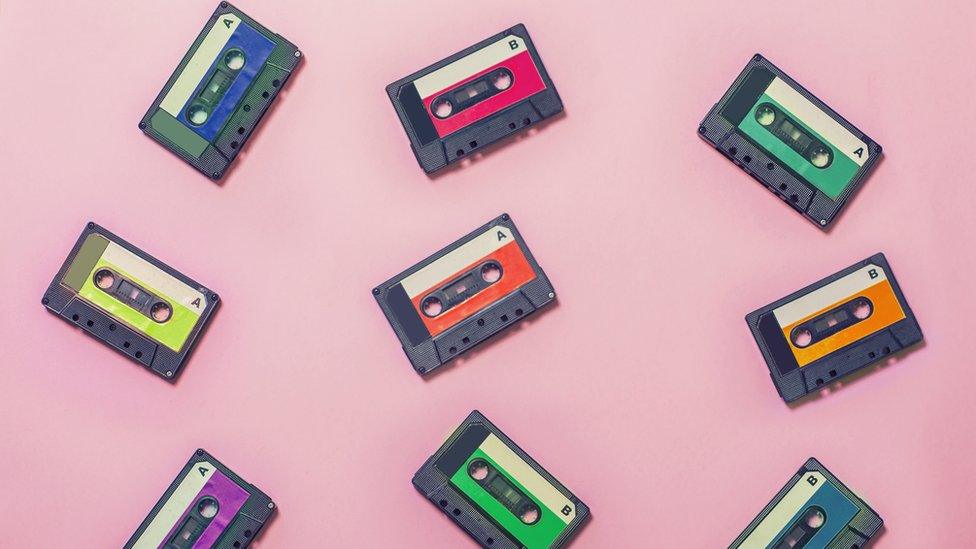Harry Styles album helped record increase in cassette tape sales last year
- Published

The British Phonographic Industry (BPI) said that during 2022, around 195,000 tapes were sold - and on ten occasions cassette sales accounted for more than 10% of the No.1 album sales in the weekly Official Albums Chart. Cassettes recorded music on both sides of a black tape and to hear the other side you had to take the tape out of a machine and put it back in the other way around! The Car by Arctic Monkeys and Harry Styles' Harry's House were the albums which sold the most cassette tapes across the UK last year.
Have you ever seen one of these before? Maybe on Horrible Histories. This is a gramophone - invented in 1887 by Emile Berliner. But before the gramophone came the phonograph. Designed by Thomas Edison in 1877, this was the first device that could record and play back music. The phonograph captured sound and engraved the movements into foil cylinders. The gramophone took things a step further, recording music onto grooved, flat disks, rather than cylinders. Much easier to transport, these disks became the earliest versions of the records we know today.
Once record players became available to buy, a standard speed was needed so that discs would play in all players. The 78 RPM (revolutions per minute) standard was introduced. This meant everyone could be sure that their records would play correctly with the best sound.
The 78 remained the standard until the LP or long play record in 1948. It slowed the record down and to further enhance the sound quality it was made from vinyl. The music grooves were "read" by a record player's needle/stylus and arm and played out of speakers. Further tech advancements allowed for smaller records of individual songs - or singles - like the ones you can see here, which helped start the pop music charts...
Fast forward into the '60s! The 8-track was a continuous loop of tape that played music. They were popular because they allowed people to listen to music on machines in their cars. But they would pause and jam if the tape got dirty, and if the tape got hot it would begin to distort. Sometimes the tape would spew out of the 8-track player all over the place!
Got your best robot moves ready? Off to the ‘80s for the Walkman! In 1979 Sony released what’s known as the Walkman. Officially they were called 'personal stereos' but the brand name caught on. It did what it said - allowing users to listen to music whilst out and about. The Walkman used cassette tapes in a portable player with headphones. People could use the buttons on the front of the Walkman to pause, play and even rewind the tape inside the player.
Now you might still have some of these! CDs - or compact discs - first appeared in 1982 and offered higher quality recordings that lasted longer than audio cassettes. Plus they looked fancy! You also didn't have to fast forward or rewind to get to your favourite tracks, you could skip to them. By 1984, the first portable CD players were available to buy - but they weren't great if you fancied running or even walking quickly whilst listening to music as they 'skipped' if you moved about too much.
A lot smaller than a CD, mini discs could store the same amount of music but took up a lot less space. And in the 1990s the smaller something was - cars, phones, computers - the better. In 1992 the MiniDisc was released by Sony. Like a CD just, mini! But they were pretty pricey so their target market - mainly teenagers - couldn't really afford to buy the expensive player or the mini discs.
Next came MP3 players like the iPod. MP3 players allowed listeners to download music files from a computer onto an electronic device to take anywhere. Users could put whatever music they wanted onto it and listen for as long as the battery life allowed. In 2007 the first iPod Touch was released - meaning users could play games and access the internet via the music player.
Now many people listen to music via streaming. With over 75 million songs to access across multiple streaming services, there's a lot of choice! It began when people realised they could use the internet to share their music files without having to download them onto a device. Did you know that the most streamed song of all time is Blinding Lights" by the Weeknd, with over 3.5 billion streams.
- Published11 May 2022
- Published9 March 2019
